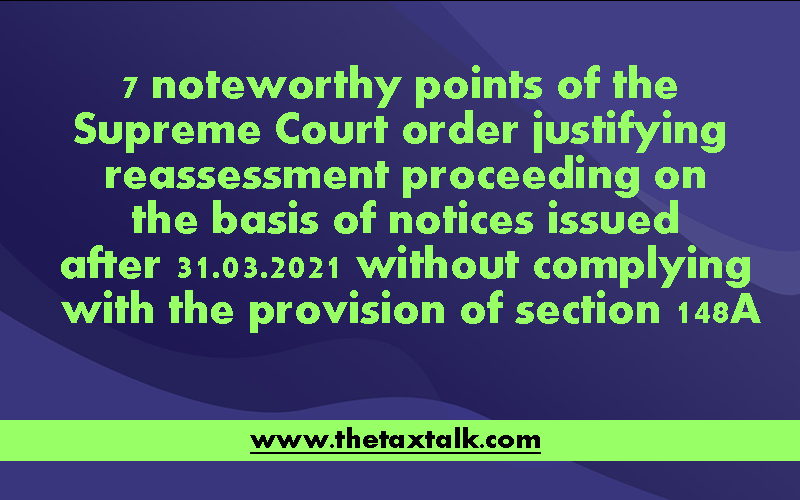![]()
7 noteworthy points of the Supreme Court order justifying reassessment proceeding on the basis of notices issued after 31.03.2021 without complying with the provision of section 148A
The landmark order by the Supreme Court has almost proved that nothing is certain in this world.
The change is prominently visible. Some of the most noticeable observation by the Apex Court, in the Case of Ashish Agarwal & others Vs Union of India & other while deciding the case No 3005/2022 is as under:
- Probably, it is for the first time happening in Indian Taxation regime that that all who are before the court and all who are not even before the court are binding by the order.The order has been taken into account the intent, cause and action making the litigation simpler and less time consuming. Out of the box order passed by the Hon’ble Apex Court needs to be read purposefully.
- The implications is going to be much wide and is a standing order for all the 90000 cases where section 148 was issued by the Ld AO. One may note that the ruling applies not only to the 9000 cases, pending before the courts or decided, but it applies to all 90000 cases where the proceedings were initiated.
- It has clubbed the provisions of section 148 with 148A together. The learned AO cannot initiate any actions without prior approval of the competent authority. There is check and responsibility even at the time of conducting enquiry. In para 6.1 the Honble court had emphasised over the minimization of litigation.
- The latest order by the Hon’ble Supreme court would have the impact of nullifying the order of the all the High courts which have decided the issue in favour of the assessee. It mean that all the cases which have been quashed by the Hon’ble High Courts of different Jurisdiction shall get new life taking in account the provisions of section 148A as pronounced by the Hon’ble SC.
- The purpose of Taxation Relaxation Act, 2020 has also been very well interpreted by the Honble SC. The rulings in GKN Driveshafts has been emphasised. It further emphasises in simplification of Law.
- As a result of the Apex court order, AO now has to conduct an enquiry, before initiating any action under section 148 & has to follow those directions laid down under 148A.
- There are various cases that would have been barred by the limitation. It may be ntoed that the changed provisions of section 149 would apply here & Reassessment would be limited just for 3 years in normal course and 10 years if the escaped income exceeds Rs. 50 Lakh in certain cases.


